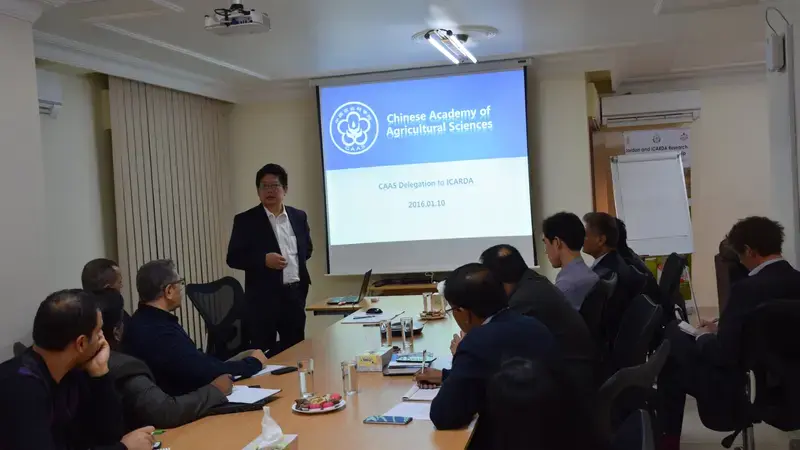ICARDA and CAAS collaborate under ‘One Belt, One Road’ strategy

A Chinese Academy of Agricultural Sciences (CAAS) delegation, led by Professor Mei Xurong, Director of National Engineering Lab for Improving Crops Water Use Efficiency and Drought Mitigation, Institute of Environment and Sustainable Development Agriculture, visited ICARDA’s offices in Jordan and Lebanon on 8-14 January, 2016. Dr. Kamel Shideed, ICARDA’s Assistant Director General, welcomed the delegation and emphasized the long-standing partnership between ICARDA and CAAS which goes back to the early 1980s and incorporates a wide range of activities from capacity development to crop improvement and the exchange of germplasm.
Professor Mei Xurong shared the outcomes of the International Workshop on Climate Change and Integrated Dryland Agriculture Ecosystems, held in Beijing in November 2015, in which collaborative measures were discussed on crop improvement, water and land productivity, watershed management and enhanced crop-livestock production system to improve dryland resilience and livelihoods under the growing threat of climate change. Explaining the main themes of a joint initiative on technical integration and pilot demonstration on climate smart dryland agriculture, he said, ‘Through this we intend to achieve improved crop productivity, enhanced biodiversity and improved livelihoods for poverty reduction.’
The main purpose of this visit was to discuss the collaborative activities under the Center of Excellence for Dryland Agriculture (CEDA) and ways to expand cooperation within the initiative of ‘One Belt, One Road’ strategy. The delegation held discussions with ICARDA’s scientists and visited the Terbol Station in Beka’a Valley, Lebanon. CEDA is a collaborative platform for agricultural research established by CAAS, ICARDA and ICRISAT which is implementing a research agenda for China’s dry areas jointly with other partners.
